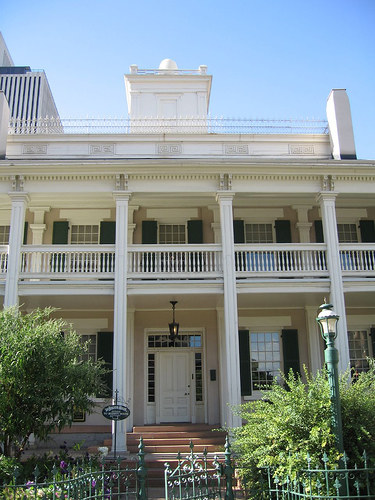Difference between revisions of "Beehive house"
(→External link) |
|||
| Line 6: | Line 6: | ||
Young was a polygamist, and the Beehive House was designed to accommodate him and some of his wives and his children by them. The Lion House was built to accommodate up to 12 more wives and their children, and became his official residence after its construction. | Young was a polygamist, and the Beehive House was designed to accommodate him and some of his wives and his children by them. The Lion House was built to accommodate up to 12 more wives and their children, and became his official residence after its construction. | ||
| − | The Beehive House served as the executive mansion of the Territory of Utah from [[1852]] to [[1855]] and was where Young entertained important guests. After Young's death, it served as the residence of two subsequent | + | The Beehive House served as the executive mansion of the Territory of Utah from [[1852]] to [[1855]] and was where Young entertained important guests. After Young's death, it served as the residence of two subsequent Church presidents, [[Lorenzo Snow]] and [[Joseph F. Smith]], both of whom died in the mansion. |
A beehive atop the mansion was used by Young to represent industry, an important concept in the restored gospel of Jesus Christ and the colony of Saints. The meaning is derived from the word ''[[Deseret|deseret]]'' from Ether 2:3 in the [[Book of Mormon]]: "And they did also carry with them deseret, which, by interpretation, is a honey bee; and thus they did carry with them swarms of bees."[https://www.churchofjesuschrist.org/study/scriptures/bofm/ether/2.3?lang=eng&clang=eng#p3] | A beehive atop the mansion was used by Young to represent industry, an important concept in the restored gospel of Jesus Christ and the colony of Saints. The meaning is derived from the word ''[[Deseret|deseret]]'' from Ether 2:3 in the [[Book of Mormon]]: "And they did also carry with them deseret, which, by interpretation, is a honey bee; and thus they did carry with them swarms of bees."[https://www.churchofjesuschrist.org/study/scriptures/bofm/ether/2.3?lang=eng&clang=eng#p3] | ||
Revision as of 17:15, 24 February 2021
The Beehive House is one of the two official residences of Brigham Young. The Beehive House gets its name from the beehive sculpture atop the house. It was designed by Young's brother-in-law and architect of the Salt Lake Temple, Truman O. Angell, who later designed Young's other residence, the Lion House.
The Beehive House was constructed in 1854, two years before the Lion House. The Lion House is adjacent to the Beehive House, and both homes are one block east of the Salt Lake Temple and Temple Square on the street South Temple in Salt Lake City, Utah. It is constructed of adobe and sandstone.
Young was a polygamist, and the Beehive House was designed to accommodate him and some of his wives and his children by them. The Lion House was built to accommodate up to 12 more wives and their children, and became his official residence after its construction.
The Beehive House served as the executive mansion of the Territory of Utah from 1852 to 1855 and was where Young entertained important guests. After Young's death, it served as the residence of two subsequent Church presidents, Lorenzo Snow and Joseph F. Smith, both of whom died in the mansion.
A beehive atop the mansion was used by Young to represent industry, an important concept in the restored gospel of Jesus Christ and the colony of Saints. The meaning is derived from the word deseret from Ether 2:3 in the Book of Mormon: "And they did also carry with them deseret, which, by interpretation, is a honey bee; and thus they did carry with them swarms of bees."[1]
The Young family maintained the home for a while after Young's death, but eventually sold the house to The Church of Jesus Christ of Latter-day Saints. After this time it was used as the official home of Church presidents, later as the home economics wing of Latter-day Saint University, and then a dormitory for young women. The Young Women's organization of the Church also rented out rooms in the home for wedding receptions.
Under Church ownership, the Beehive House was restored in 1960. It is now a tourist attraction.
